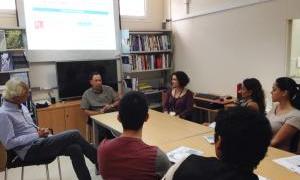Bonaventura Clotet opens the 5th edition of the Master in AIDS Pathogenesis and Treatment

The master provides a broad view of the fields of immunology and virology, exploring in depth the antiretroviral treatment and the paths for virus eradication. It also includes knowledge about scientific management and the interaction between science and society and the need for responsible research.
- The program is the result of a collaboration between the IrsiCaixa AIDS Research Institute, the Universitat Autònoma de Barcelona (UAB) and the Escola Universitària d’Infermeria i Fisioteràpia Gimbernat.
- Students coming from fields such as medicine, biotechnology and biochemistry will be integrated in IrsiCaixa research groups until June.
The director of the IrsiCaixa AIDS Research Institute, Bonaventura Clotet, welcomed this week the students of the new edition of theMaster in AIDS Pathogenesis and Treatment, coordinated by him. The program will explore the fields of immunology and virologyuntil June, emphasizing antiretroviral treatment and the paths for virus eradication. Furthermore, it will also focus on other retrovirus and their potential implications in human pathologies, the management of scientific activity and the interaction between science and society. The master is an official program of the Universitat Autònoma de Barcelona, provided by the Escola Universitària d’Infermeria i Fisioteràpia Gimbernat and organized in partnership with the IrsiCaixa AIDS Research Institute.
Clotet said that, in addition to extending the knowledge of students on virology and immunology, the master is designed to enhance their scientific vocation by working together with researchers and discovering new research techniques. "We hope that studying this master would make you as happy as we feel organizing it", wished Bonaventura Clotet.
Participation in the institute research
The program consists of seven modules coordinated by senior researchers. The theory lessons will be held at IrsiCaixa and the Hospital Germans Trias, including some open lessons.
Students coming from fields such as medicine, biotechnology and biochemistry will choose between an internship at IrsiCaixa biosafety laboratory or in the HIV Unit of the Hospital Germans Trias i Pujol. "The internship is not only focused on learning, but all students will participate in current research projects", said José Esté, coordinator of the Internship and head of the IrsiCaixa HIV Pathogenesis group. Thus, by interacting with IrsiCaixa research groups, students will implement the knowledge and techniques learnt and will study a wide range of disciplines within the field of HIV and other retroviruses, which is unusual in other centers.
Scientific management and responsible research
Students will also learn about scientific activity management, with the aim of acquiring complementary basic knowledge to successfully develop a research career. Finally, they are invited to think about the interaction between science and society and the importance of developing a scientific activity that meets the needs and expectations of society, to be carried out together with various stakeholders (industry, civil society organizations, politicians, educators, etc.), also known as responsible research.
Manu Sáez, student of this edition, says that specializing in HIV is “a challenge”, especially because it triggers a syndrome as widespread as AIDS. Another student, Maria Pujantel, adds that specializing in HIV not only allows to do research on HIV / AIDS, but provides a broad view of "the most skilled virus". "Knowing how it works can be used to take advantage of its resources to fight other viruses", she adds.
Commitment to teaching
This is the fifth edition of the Master in AIDS Pathogenesis and Treatment, the third as an official title, which was created out of the need to train professionals with specific expertise in clinical and basic research. In addition, since October 2013, the Universitat de Vic and its Chair of AIDS and Related Diseases collaborate with IrsiCaixa and the Fight against AIDS Foundation to generate and disseminate scientific and technological knowledge about HIV and other fields such as aging, hepatitis, chronic fatigue and cancer. The institute receives several predoc and postdoc researchers every year and coordinates, together with "la Caixa" Foundation,Xplore Health and IrsiCaixa Outreach educational programs, which aim to bring the biomedical research to young people.